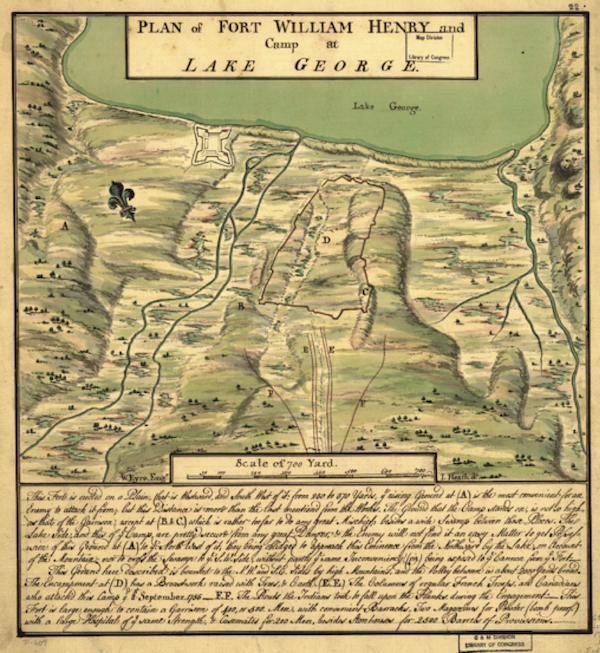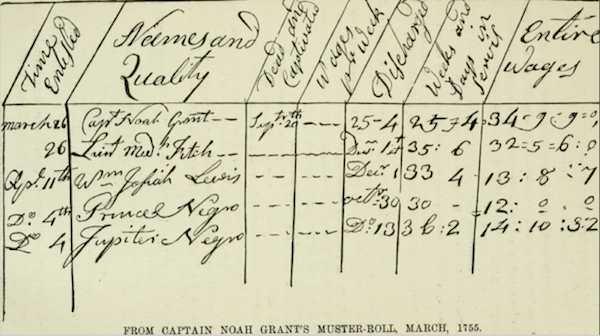The Curious History of Ulysses Grant's Great Grandfather

Fort William Henry, 1755
During the summer of 1756, Lieutenant Quintin Kennedy led a motley band of British Regulars, Scottish Highlanders, Mohawk warriors, and Provincial troops on a scouting party in the dense woods north of Lake George in New York. At that time, British forces and their Indian allies were sporadically engaging in violent clashes with French troops and their Indian allies in this fiercely contested region as part of the French and Indian War that broke out in 1754. Kennedy, who fought in the devastating British defeat at the Battle of the Monongahela in July 1755, had subsequently adopted Indian dress and military tactics. It was even rumored that Kennedy had married an Iroquois woman.
In one account of the scouting party, a British journal reported that Kennedy went “a-scalping, in which he had some success.” Kennedy’s group of sixty soldiers spent forty days in the woods creating havoc in New France, burning homes and killing several French settlers. His men destroyed property worth between 8,000 and 10,000 £ sterling. Upon their return to Fort William Henry, at the southern tip of Lake George, they brought back “one scalp, and two prisoners, who were the tavern-keeper and his wife, whose house, with others, they also burnt.”
All of Kennedy’s party returned safely on September 20, 1756, except for three individuals: “Captain Grant of Connecticut, and a cadet of the regulars, and one of the Highlanders, —a poor drunken fellow, not able to travel, they left behind to surrender himself to the enemy.” Captain Grant’s body was never found, alas. A Connecticut newspaper declared that Noah Grant died on Sept. 20, 1756, “Killed near Lake Champlain.” Tragically, Noah’s younger brother Lieutenant Solomon Grant had been killed in June 1756, after his scouting party was attacked by Indians in western Massachusetts.
Captain Noah Grant’s brief military career has been forgotten, but he is still remembered today for being the great grandfather of Ulysses S. Grant, who would become the general-in-chief of the United States Army over one hundred years later. Noting Noah Grant’s military service, Jesse Root Grant said of his son Ulysses, “The General comes of good fighting stock.” Noah Grant’s life helps us better understand Ulysses S. Grant in another way as well.
Ever since Matthew Grant first arrived in the New World at Dorchester, Massachusetts, in 1630, the Grant family had been instrumental in settling, exploiting, and defending the American frontier—first in the wilderness of Massachusetts and later in Connecticut, Upstate New York, Pennsylvania, and Ohio. Ulysses S. Grant might have been ambivalent about slavery when the Civil War broke out in April 1861, but he never wavered in his support for the Union. The story of the Grant family had been inextricably linked to the westward expansion of America for over two centuries.
At 37 years old, Noah Grant of Tolland, Connecticut, volunteered for military service after the General Assembly of Connecticut authorized the mobilization of 1,000 troops in early 1755. Like the 23-year-old Colonel George Washington, who commanded a Virginia regiment after the Battle of Monongahela, he’d be fighting on behalf of the British Crown. Later that year, Lieutenant Noah Grant participated in an unsuccessful expedition to take Fort Crown Point on Lake Champlain. The evidence suggests Noah was a brave and trustworthy soldier. In May 1756, he received a gratuity from the Connecticut Assembly worth thirty Spanish milled dollars for “extraordinary services and good conduct ranging and scouting, the winter past, for the annoyance of the enemy near Crown Point.” He was also promoted to Captain of the Seventh Company, Second Connecticut Regiment in March 1756.

According to muster rolls written by Noah Grant, there were several African American soldiers in his company, as the names Prince Negro and Jupiter Negro clearly indicated. Solomon Scipio and Jonah Chapman were two additional men in Grant’s company that were likely African Americans. It’s a curious fact of history that Captain Noah Grant’s great grandson would eventually expand opportunities for African American soldiers during the Civil War. There didn’t appear to be segregation among troops during the French and Indian War and it was widely acknowledged that Black troops were effective.
The fighting experienced by Noah Grant was shockingly violent. Scalping and other unspeakable atrocities were common during the French and Indian War. A few weeks before the disappearance of Noah Grant, eight carpenters were killed and two carters were scalped by Indians near Fort William Henry. And Grant’s scouting party returned from their expedition with at least one scalp of their own. During the war, both British and French authorities offered bounties for the scalps of their enemies. It’s conceivable that Noah Grant himself was scalped, though we have no evidence whatsoever on how he died.
Lieutenant Kennedy’s scouting party that suffered the loss of Captain Grant exemplified a revolution in military tactics on the American frontier. Major General Edward Braddock’s defeat at the Battle of Monongahela impressed upon Kennedy that the British would need to have lighter, more mobile forces to defeat the French and their Indian allies, who had perfected the art of la petite guerre. Kennedy, who first arrived in Virginia in 1755 as a young officer with the 44th Regiment of Foot, was a pioneer in learning to fight in a new way that was more suitable to American conditions than a conventional European battlefield.
According to one account, “Lieut. Kennedy has married an Indian squaw…has learned the language, paints [himself] and dresses like an Indian, and it is thought will be of service by his new alliance. His wife goes with him, and carries his provisions on her back.” The innovative tactics adopted by Kennedy and others eventually helped win a British victory in the French and Indian War, which had tremendous consequences for American history. “Freed of European rivals,” Pekka Hamalainen writes in Indigenous Continent, “the British would treat the Indians as subjects.” The Grant brothers, Noah and Solomon, played their small part in this bloody contest to open up the frontier to American settlers, who would eventually dispossess the original owners of this land.
Shortly after the Civil War broke out, Ulysses S. Grant wrote his father Jesse, “Whatever have been my political opinions before I have but one sentiment now. That is we have a Government, and laws and a flag and they must all be sustained.” His support for the Union was sincere and deeply held. This shouldn’t surprise us. The Grant family had deep connections to the American experiment from the very beginning.
Ulysses famously declared, in the opening line of his memoirs: “My family is American, and has been for generations, in all its branches, direct and collateral.” One of his ancestors had landed in the New World a mere decade after the arrival of the Pilgrims at Plymouth. Captain Noah Grant, as we’ve seen, gave his life in 1756 for the promise of securing western lands for future expansion by colonists. His son—also named Noah—claimed to have fought for independence from Great Britain during the Revolutionary War. And his son Jesse—the father of Ulysses—built a thriving business from scratch on the frontier along the banks of the Ohio River. By 1860, the Grants had made great sacrifices for their country and had been richly rewarded for their efforts, too. The sacrifice of Captain Noah Grant, during the French and Indian War, may have consciously or unconsciously influenced Ulysses S. Grant, as he decided to rejoin the United States Army in April 1861.